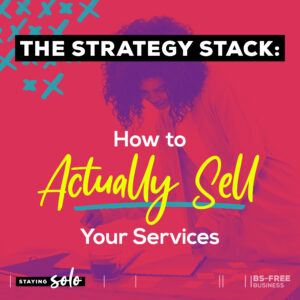
Search the site:
Grow Your Salary, Not Your Stress
Ever felt like you’re stuck on a hamster wheel with your salary, constantly running but never really getting ahead? That’s because the ‘spend money to make money’ myth has you chasing your tail and paycheck straight into someone else’s pocket.
Today, we’re taking down that toxic narrative, and trust me, it will be a game-changer for your business. Celebrity entrepreneurs love to preach that you need to go all-in, investing big bucks on courses, coaches, and shiny objects to succeed.
But here’s the truth: Over-investing can leave you underpaid and overworked.
In this episode, I will show you how to pay yourself first, grow your salary, and build a business that works for you without buying into the hype. It’s time to stop bleeding cash and get you paid.
One of the biggest money management myths that messes with solo service business owners is the idea that you should constantly reinvest back into the business.
Every business has expenses, and some “reinvesting” is reasonable as you grow. However, for years, celebrity entrepreneurs have normalized not just investing in the business but over-investing in it. They preach that making big financial moves is necessary to reach your goals. They encourage going into debt to pay for coaching and courses in pursuit of growth.
Frankly, this pisses me off as they use marketing and sales tactics that ratchet up the pressure to “spend money to make money.” Purely because it serves them and their bank accounts, the consequences of these decisions be damned.
Yet, the consequences are very real. Underpaying yourself can lead to neglecting your personal financial well-being. Prioritizing a consistent salary for yourself is critical to your business’s sustainability and financial health. Period.
Why You Don’t Always Need to Spend to Make Money
Let’s start by diving deeper into this myth that you must spend money to make money.
Yes, there are times when investing in your business makes sense—like upgrading your tools or investing in marketing—but the problem comes when you feel like you have to reinvest to your detriment. This can leave you stuck in a cycle of constantly chasing the next shiny object but never actually paying yourself what you deserve.
Here’s the thing: Your business should be working for you, not vice versa. If you’re constantly reinvesting and never taking an appropriate salary, you’re running a business that doesn’t support your financial goals.
Instead of buying into the idea that you can spend your way to success, let’s focus on managing your money better so your business becomes a reliable source of income.
Smart Money Management—The Foundation of a Steady Salary
To pay yourself appropriately, you need to manage your money in a way that supports a consistent and growing salary. You likely have your basic financials handled, like revenue and expenses, but now you need to step it up by creating a budget and getting clear on where exactly your money is going.
Your budget should include your income, fixed expenses, and variable expenses. The budget is a baseline for deciding where to cut back, invest, and, most importantly, how much you can consistently pay yourself.
And here’s the kicker—your salary should be a non-negotiable line item in your budget. I’ve seen too many solo service business owners sacrifice their salary because they’ve been seduced by shiny promises from celebrity entrepreneurs only to end up deeply disappointed.
Also, remember to review and adjust your budget regularly. Your business will evolve, and so should your financial plan. Keeping a close eye on your cash flow and expenses will help you make informed decisions that support your salary growth.
Beyond the budget, I recommend building a buffer. Having a cushion of savings for your business can give you the peace of mind to pay yourself consistently, even during slower months.
While the buffer can help you ensure you can pay yourself, it also serves the secondary purpose of showing you where you can pay yourself more.
Your buffer should be a set amount, such as three months of your salary, and at a certain point, you don’t need to keep adding to it. If funds are not allocated to your budget, you can be confident that you have the cash flow to increase your salary.
Money Mindset: Shifting How You Think About Your Salary
Now, let’s talk about mindset—because how you think about money plays a massive role in managing it.
It’s typical for solo service business owners to have many emotions about paying themselves, ranging from fear to guilt to uncertainty.
This is normal, and I want to remind you that paying yourself (and paying yourself well) is a necessary part of running a business. If you had a job, you wouldn’t show up day in and day out if you weren’t getting paid.
You deserve to be paid well for your skills and talents. And if you’re not convinced, please look at salaries for a comparable position for what you do.
I once had a client struggling with how much to pay herself. I had her look at pay ranges for VPs of Marketing. She was floored by the market rate for this role in her industry and quickly understood that it was reasonable for her to pay herself more.
Your money mindset isn’t about manifesting millions but accepting that you have complex thoughts and feelings about money that must be managed. So, if you feel like you need to invest more in the business, or you shouldn’t pay yourself more, or however this may show up for you, I want you to know you DESERVE to be paid for the value you’re bringing to your clients and your business.
This mindset shift will help you prioritize your salary and make decisions that support your financial well-being. Remember, the whole point of running your own business is to create a life and income that works for you—not to work yourself into the ground.
Your business can’t thrive if you’re constantly stressed about money, so start thinking of your salary as a necessary investment in your well-being—and, ultimately, in the success of your business.
Pricing Strategy: How to Set Prices That Support Your Salary
It’s no secret that how you price your services directly impacts your ability to pay yourself a healthy salary.
Remember the time vs. money trap I discussed in the last episode? You want to make more money but don’t want to work more to accomplish that, so you end up stuck. Pricing is the most direct way to break out of this vicious circle.
I won’t tell you to raise your prices like it’s no big deal. Instead, it’s about having a pricing strategy that aligns with your salary needs so everything works together.
Returning to the “enough” number shared in the last episode, you must set a salary goal. As much as revenue goals can be helpful, a desired salary goal enables you to reverse engineer what you need to make in the business.
I’ve created a salary calculator, which is included in the Calculator Kit, which you can grab for free. The calculator makes the math easy and lets you play with the numbers. When you’re done with that, you’ll have your desired salary number and the monthly revenue you need to make that happen, accounting for your expenses and taxes.
For example, if you need monthly revenue of $9,000 to meet your salary goal, you can create a pricing strategy to help you achieve it (instead of winging it and hoping it works out!).
I’ve discussed pricing strategy extensively on this podcast, but having a high enough hourly rate is the advanced move that helps you break free of the time/money trap.
When I ask people what their hourly rate is, they think about it from the perspective of a number that feels good to their clients, not what will meet their needs.
Your pricing strategy needs to start with your baseline hourly rate. To calculate this, you must determine your ‘billable” hours per week, how many weeks a year you’ll work, and how much you want to make. (There’s a calculator for this in the Calculator Kit.)
Even if you don’t charge by the hour, your baseline hourly rate guides you to price your services accurately and shows you where you need to charge more. (I can’t tell you how many people don’t get this and will fight me.)
Using this information, you can start pricing your services to support your capacity and salary goals, such as:
- Charging more per client or project.
- Working fewer hours or not exceeding your capacity.
- Scoping packages, projects, or retainers so you’re not overservicing.
Speaking of overservicing, the project pricing calculator (also in the Calculator Kit) helps you add a buffer to save yourself from your optimism about how a project will go.
Making Your Salary a Priority
To wrap up, remember one key thing: Your salary should be a cornerstone of your business, not an afterthought. When you prioritize your salary and getting yourself paid, you’re forced to think carefully about your capacity and how you spend your money.
You don’t need to spend much money to learn a secret strategy to pay yourself more. The key is to make it happen by focusing on your business’s foundations, such as your financials and pricing.
Remember, you want to grow your salary but not your stress, so you want to skip the shortcut and get strategic about how you’re doing to make it happen.
Be sure to check out new Breaking Free From the Time vs. Money trap mini-training here.

I’m Maggie Patterson (she/her), and services businesses are my business.
I have 20+ years of experience with client services, am a consultant for agency owners, creatives, and consultants, and vocal advocate for humane business practices rooted in empathy, respect, and trust.
Read or Listen to the Latest
Check Out These Posts
For Solo Business Owners

Growing a solo service business is tough.
It’s even harder when you’re bombarded with BS advice that steers you away from your values and why you started your business in the first place.
This is the podcast for solo creatives and consultants who want to remain as a team of one and have zero interest in the hustle and grind of typical business teachings.
Subscribe now and never miss an episode.
For Micro Agency Owners
Most podcasts for agency owners obsess over revenue growth as the ultimate success metric.

But here’s the truth: not everyone wants to make millions. Your goal might be to build a sustainable business that lets you have a life and doesn’t run you into the ground.
Join me as I spill my shameless confessions and share everything I’ve learned about building a micro agency that skips the BS of tired and typical agency teachings.
Follow Now on All Major Podcast Platforms








